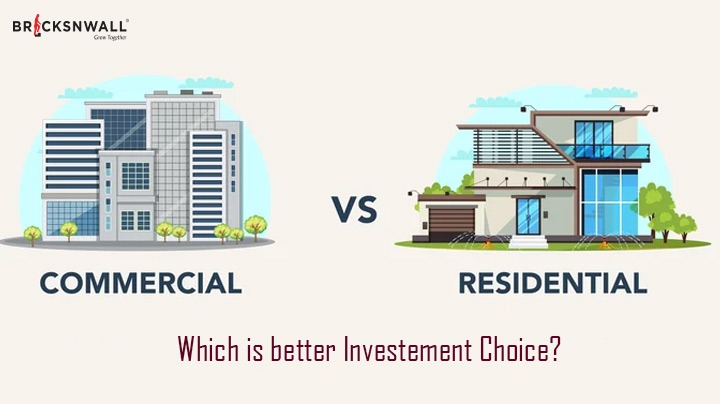Commercial or Residential Investment: Making the Right Choice
Bricksnwall Trusted Experts

Introduction:
When it
comes to investing in real estate, one of the crucial decisions is choosing
between commercial and residential properties. Both options offer unique
opportunities and potential returns, but it's essential to understand the key
differences before making your investment choice. In this article, we will
explore the pros and cons of each to help you make an informed decision.
Commercial
Investment:
Commercial
properties include office buildings, retail spaces, warehouses, and industrial
complexes. Investing in commercial real estate can be lucrative for several
reasons:
Higher
Income Potential: Commercial
properties generally generate higher rental income compared to residential
properties. Long-term leases with businesses often come with higher rent rates,
providing a stable and consistent cash flow.
Longer
Lease Terms: Commercial leases typically have longer durations,
usually three to five years or more. Longer lease terms offer greater stability
and reduce the risk of frequent tenant turnover.
Professional
Relationships: Commercial tenants tend to be businesses, which means
you're dealing with professionals who are committed to maintaining the
property and their operations. Additionally, commercial leases often include a
triple net lease (NNN) structure, where tenants are responsible for property
expenses, such as maintenance, insurance, and taxes.
However,
commercial investment has its challenges:
Higher
Initial Investment: Commercial properties generally require a higher initial
investment compared to residential properties. The costs of purchasing,
maintaining, and managing a commercial property can be substantial, especially
for larger buildings.
Market
Volatility: The commercial real estate market is more sensitive to
economic fluctuations. During economic downturns, businesses may downsize or
close, leading to increased vacancy rates and potential income loss.
Residential
Investment: Residential properties include single-family homes,
apartments, and condominiums. Investing in residential real estate has its own
set of advantages:
Lower
Barrier to Entry: Residential
properties typically have a lower entry cost, making it more accessible for
individual investors. This allows for
Diversification
within the market and the potential to start with a smaller investment.
Wider
Pool of Tenants: The demand for housing is consistently high, providing a
larger pool of potential tenants. Residential properties offer the
opportunity
to generate steady rental income, especially in densely populated areas or
regions with strong rental markets.
Appreciation
Potential: Residential properties have historically shown long-term
appreciation. As the property value increases over time, investors can build
equity and potentially benefit from capital gains upon sale.
However,
residential investment also has its challenges:
Tenant
Turnover: Residential properties typically have shorter lease terms, resulting in
a more frequent turnover. Finding new tenants, handling vacancies, and managing
tenant-related issues can be time-consuming and impact cash flow.
Higher
Maintenance Costs: Residential properties often require ongoing maintenance
and repairs, especially with multiple tenants. Investors must allocate funds
for regular upkeep to ensure the property remains attractive to tenants and
maintains its value.
Conclusion:
In the
commercial vs. residential investment debate, there is no definitive answer as
to which is better. It ultimately depends on your investment goals, risk
tolerance, available capital, and market conditions. Commercial properties
offer higher income potential and longer lease terms but require a larger
upfront investment. Residential properties offer a lower barrier to entry and a
wider tenant pool but come with more frequent turnover and maintenance costs.
To make the
right investment choice, carefully consider your financial situation, research
the local market conditions, and seek advice from real estate professionals.
Diversifying your portfolio by investing in both commercial and residential
properties can also be a viable strategy.
Remember,
successful real estate investment requires thorough due diligence, proper
financial planning, and a long-term perspective. By weighing the pros and cons
of commercial and residential properties, you can make an informed decision
that aligns with your investment objectives and helps you achieve your
financial goals.




